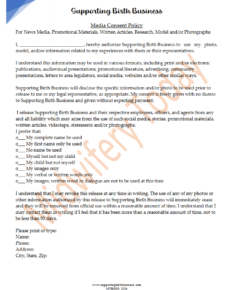
The Tragic Ending of a Healthy Pregnancy
Editor’s note: This article first appeared in Midwifery Today, Issue 99, Autumn 2011.
Subscribe to Midwifery Today Magazine
After carrying my daughter in my womb for 39 weeks and 3 days, I was more than ready to hold her in my arms and shower her with all the love I had been accumulating. I had seen my OB a few days before and was thrilled by the news that my cervix had already started to open and the water might break anytime. I felt some tightening in my tummy but didn’t feel any pain. I wasn’t sure if it was Braxton Hicks or the baby moving that made my belly change shape. She was a very active fetus and made her need for space known if my sleeping position was getting in her way.
I was a little concerned about her well-being when my daughter didn’t protest my position for an entire night, no matter how I slept. I thought maybe she was growing bigger and had limited space to move vigorously, or that she was trying to be nice to mommy. I woke my husband up at five in the morning and told him that I didn’t feel the baby moving. Being a physician, he felt the urgency to go seek help when he couldn’t hear his daughter’s heartbeat with his stethoscope. Within half an hour, we were inside the triage room.
The nurse traced the rhythm of my uterine vessels with the fetal monitor, and then the resident on duty brought in a portable ultrasound. My husband carefully looked at the monitor while the doctor moved the ultrasound probe over my abdomen, her eyes also fixed on the monitor.
“I am sorry…” was all I heard when she pointed to my daughter’s non-beating heart. I looked at both of them for any change in facial expression because I couldn’t believe those words meant the baby was no longer alive. The doctor wiped my belly and exited the room without another word. When I asked my husband what he saw, he grabbed my hand tight and, after a long, deep breath, finished the sentence, “…I think we lost her.”
At that moment my world stopped moving. Just a moment before, I hadn’t thought my baby was dead, not even for fraction of a second.
“Oh, god! Please don’t do this to me.” I remember saying those words repeatedly.
The mother inside me became blind, deaf and listless. She wanted to crawl out of my body and jump into the freezing waters of Lake Michigan to cool her burning soul. My attending physician wasn’t at the hospital, but had given orders to start me on Pitocin to induce labor. I didn’t appreciate the resident referring to my baby as a “product of conception.” I reminded her that every one of us was a product of conception; the only difference was that my baby was dead. We had named her already, and though I didn’t expect them to call her by her name, I did expect them to show some respect and call our full-term baby “a fetus,” if not “a baby.”
I asked to go out for half an hour before they hooked me up to some kind of tubes. They agreed so long as my husband accompanied me. I was suffocating; I needed air. I wanted to feel the wind blow, see the flowers blossom, listen to the sound of the river, do anything, just forget that I had ever been pregnant.
I had done everything by the book. I’d had regular antenatal checkups, refrained from eating, drinking or doing anything that was not recommended, took vitamins regularly, read good books, kept myself positive and lived a healthy lifestyle. I had a very healthy, uncomplicated pregnancy throughout. I couldn’t think of a reason why they couldn’t find my daughter’s heartbeat. Nobody had an answer as to what went wrong. All they told me was it wasn’t my fault, which I knew. I wanted to ask my OB to double check my baby’s heartbeat just to make sure, but hesitated because I feared it would look like I was in denial. I kept hoping that I would feel her movements again.
After she poked my hands in couple of places, the nurse brought a stack of papers to sign and I had to make a decision about how I wanted to bury my baby. Having been a nurse for about a decade, I understand the importance of documentation, consent, privacy and patient rights issues. The nurses were very kind and sympathetic. However, I was offended by the fact that I was asked to make a decision on how I wanted to sever the tie with my child while she was still inside my body, and when I hadn’t yet accepted that she was dead. Planning her last rites meant giving my baby to unknown hands, and not being able to feel her, see her or touch her. It wasn’t what I wanted, but it was the reality and something I had to accept. We walked out of the hospital six hours after my uterus was emptied. The sound of the newborn babies crying hurt my chest.
Our nursery at home looked so bare when I came back empty-handed, our daughter’s name hanging on top of her crib with a “welcome home” sign next to it. I scanned the room. Everything was lifeless. I unfolded all her dresses, held them against my chest and cried until there were no more tears left in my eyes.
My breasts geared up when they got the signal that the baby was out. The stitches on my bottom made it difficult to sit or use the bathroom. I didn’t want to lie down. Home didn’t feel like home. I needed air.
We took a short walk that evening. When spotted by people I knew, they asked if I’d already had the baby. They congratulated me when I nodded, signaling yes. Some people who hadn’t seen me before asked if I was pregnant.
For several days, I ignored phone calls from family, friends and co-workers curious to hear the good news. I had no news for them. I had no courage to talk about it. I was afraid I might go insane. I felt emptiness inside me, as if some part of me had vanished. I feared that everybody I loved would die and that I would be unable to do anything about it, just like I wasn’t able to do anything when my daughter died inside my body. The feeling of helplessness crippled me for months.
Medical science didn’t have answers as to why God chose to take our angel away from us. The results of all the tests they ran on the baby didn’t give any clue as to what went wrong. I went through every scientific journal available on the Internet looking for answers. There was no evidence or information to explain the mysterious, tragic end to my healthy, full-term pregnancy.
Like any other married couple ready to start a family, my husband and I had been overjoyed when we saw the results of my home pregnancy test. We immediately started preparation to welcome the new member of our family. We spent time talking about our baby, imagining the happiness her presence would bring to our lives. It took our family months to cope with the loss.
There is still not a single day that I don’t think about my child. I am pregnant again, but the fear of losing this child is so strong that we have been hiding the news from our circle of friends and family. I hope no parent has to go through the experience my husband and I went through.
Postscript: The author went on to deliver a healthy baby girl.





















